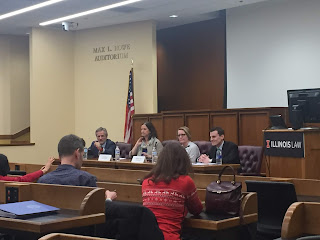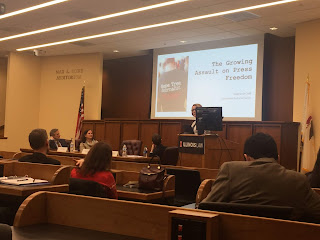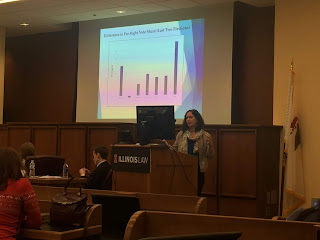 |
| Photo by Libby Wheeles |
by Sydney Lazarus
On March 4, 2020, the European Union Center hosted an interdisciplinary symposium titled “From the End of History to the Crisis of Liberal Democracy: A Symposium on Europe” at the Law Building. The symposium’s speakers represented three different disciplines and institutions. Francesco Biagi is a senior assistant professor of comparative public law at the University of Bologna, as well as a visiting professor of law at the University of Illinois, Urbana-Champaign. Stephanie Craft is a professor of journalism at the University of Illinois, Urbana-Champaign. Jae-Jae Spoon is a professor of political science at the University of Pittsburgh and the director of the University of Pittsburgh’s European Studies Center.
Francesco Biagi’s presentation focused on Poland and Hungary, the “most evident cases in Europe of departure from democratic standards and European constitutional heritage.” Dr. Biagi gave three reasons for anti-constitutional backsliding in Hungary and Poland. First, although both countries made a successful transition to democracy, neither of them has produced a strong enough democratic culture that could act as a bulwark against authoritarianism. Second, the transition from a centralized economy to a market economy meant that many segments of the population in Poland and Hungary experienced economic inequality, a matter that was made worse by the financial crisis of 2007-2008. Third, the growing popularity of identitarian politics and rhetoric has also boosted the rise of Orbán, Kaczyński, and their parties.
However, recently the Polish constitutional court declared three laws to be against EU law, which, Dr. Biagi argued, represented a departure from the trend of the last several years, during which Polish courts increasingly acted as vessels of the executive branch. Dr. Biagi ended his presentation with the suggestion that the EU cut off structural funds to countries that are violating EU principles.
The next presenter, Stephanie Craft, spoke on the issue of a growing assault on press freedom in Europe and in the U.S. In Hungary, media outlets were closed or sold to entities with government ties, thereby silencing them. Kaczyński criticized Gazeta Wyborcza, Poland’s leading newspaper, as “against the very notion of the nation.” In Serbia, there has been surveillance of reporters and smear campaigns in pro-government tabloids. In Slovakia, the investigative journalist Jan Kuciak and his fiancée were shot in a targeted killing in 2018. Kuciak had been investigating political corruption and organized crime, and Marian Kocner, a Slovak businessman who is accused of organizing the murder, had been implicated in Kuciak’s reporting.
 |
| Photo by Libby Wheeles |
Dr. Craft gave several reasons for why there has been a decline in media freedom over the past decade. Over the past decade and a half, media outlets have been facing the problem of a broken business model. Traditionally, they have relied on advertising for revenue, a model that has become outdated. The rise of digital media outlets has transformed the news environment and flooded the journalism industry with competitors. At the same time, journalism norms and practices — for instance, reporters who cover politics might choose to refrain from voicing political opinions or voting — have been slow to change. Dr. Craft argued that journalists need to work in concert to point out violations of press freedom and that we — as the public — need to confront what future leaders might learn from the success of the current assault on press freedom.
The final presenter, Jae-Jae Spoon, spoke about the decline of mainstream political parties in Europe and the implications for liberal democracy. Mainstream parties on either side of the political spectrum have been losing votes and seats in government. Center-left parties in countries including France, Netherlands, Hungary, Germany, and the U.K. have seen their vote shares decline in the past two elections. This decline has been particularly stark in France, where the Socialist Party lost 250 seats in the 2017 election.
What explains this decline? The story of the center-right parties has been one of contagion from the far right, and for the former, their only choices are to accommodate, oppose, or ignore the latter. Dr. Spoon noted that research findings on whether accommodation reduces the vote share of far-right parties have been mixed. The center-left parties, Dr. Spoon explained, have struggled to offer solutions to problems that voters care most about. A shift in focus from politics of redistribution to politics of recognition may have pushed away working-class voters, whom the social democratic parties have historically represented. In the case of Britain, the Labour Party has been struggling to hold on to its working-class constituencies in Northern England and the Midlands (the so-called “red wall” that, until recently, has steadily voted Labour). Some of these voters are now voting for the Conservatives; others are voting for the far right, whose anti-migrant positions are presented as protecting native workers.
 |
| Photo by Libby Wheeles |
Dr. Spoon noted that the Labour Party’s recent struggle to hold on to its working-class constituencies may be an anomaly, rather than the start of a trend. As for whether the decline of mainstream political parties represents a crisis for liberal democracy or a wake-up call, Dr. Spoon suggested that perhaps it is the latter: “Parties are meant to link citizens to government. If they aren’t doing this, other parties will form and attract voters. It is then the responsibility of the mainstream parties to get their voters back by doing what parties are supposed to do.”
The question of whether we are seeing a crisis and how new this crisis is was further discussed during the Q&A session following the presentations. Emanuel Rota, director of the EU Center, asked, “How much of what we are witnessing is an actual decline and not disappointment over what we had expected in 1989, [that is], a world progressing not the way liberals would like it to go?” Dr. Spoon agreed but also noted that something that is new is the number of challenges to liberal democracy in Europe, as well as the rise of the far-right parties.
This symposium was generously supported by a Jean Monnet Center of Excellence grant from the European Commission’s Erasmus+ program.

From the End of History to the Crisis of Liberal Democracy: A Symposium on Europe



 The religions and cultures that predominate the Middle East permeate through all aspects of society. For instance, Islamic law creates a unique economic situation for banking in countries with Muslim populations. A class guest speaker from the Islamic banking industry shared details of Islamic investment portfolios and strategies that allow for investing without “ribah” (interest) because it is not permitted in Islam. The bank might buy a product and then sell that product to a business at a higher cost, rather than providing a loan with interest, or perhaps might take a share of the businesses’ gains. Additionally, Islam at times intersects with politics; another speaker discussed the Muslim Brotherhood, and his perception as a supporter varied greatly from what I’ve heard in other venues. He strongly believed the ultimate goals of the Brotherhood are democracy and social service provision.
The religions and cultures that predominate the Middle East permeate through all aspects of society. For instance, Islamic law creates a unique economic situation for banking in countries with Muslim populations. A class guest speaker from the Islamic banking industry shared details of Islamic investment portfolios and strategies that allow for investing without “ribah” (interest) because it is not permitted in Islam. The bank might buy a product and then sell that product to a business at a higher cost, rather than providing a loan with interest, or perhaps might take a share of the businesses’ gains. Additionally, Islam at times intersects with politics; another speaker discussed the Muslim Brotherhood, and his perception as a supporter varied greatly from what I’ve heard in other venues. He strongly believed the ultimate goals of the Brotherhood are democracy and social service provision.



